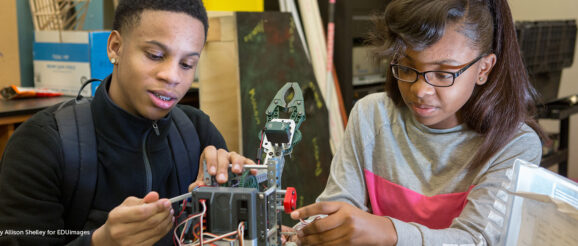Keeping People at the Heart of Innovation – Digital Promise

Elevating Innovation, a recent virtual conference put on by Digital Promise and Verizon Innovative Learning, was an intentional pairing of strategies, real-world examples, evidence-based practices, equity-focused truths, and intentional ways to leverage technology to maximize student learning experiences. Featuring 21 sessions on topics ranging from immersive technologies and AI, to project-based learning, to creating a culture of innovation, the event was filled with thought-provoking ideas and challenges to disrupt inequitable systems of the past. Throughout the event, conversations consistently circled back to one fundamental truth: as systems shift and technologies evolve, we must keep people at the heart of innovation . It’s never been more clear that the path to elevating innovation is paved with intention, empathy, and a profound understanding of the human narrative. In reflection, I offer four ways to elevate innovation in education: As an educator, how do you create an environment where people want to be? How do you intentionally foster a culture of connectedness, where all feel seen, heard, and valued? Whether a colleague across the hall, those in a faculty room, or students in a classroom, we must be intentional in our actions, as every interaction matters. It’s imperative that we choose our lens each day, even in the face of adversity. Mindset matters. It’s no secret that the foundation of a positive culture is strong, trusting relationships. So, how do you work to build trust each day? Educators can build trusting relationships by making their actions match their words, showing genuine interest in students’ lives outside of academics, celebrating their successes, and providing support during challenging moments. Intentionally building relationships with colleagues enhances the sense of community and mutual support. In such a culture, innovation isn’t a buzzword; it’s the natural outcome of a community where everyone feels a valued part. In my most recent book, Personal & Authentic: Designing Learning Experiences that Impact a Lifetime, I share how “If we care more about what we teach than who we teach, we have lost the purpose of the work.” As such, empathy is not just a part of the innovation process; it’s the compass , guiding us toward a more inclusive, effective, and deeply human approach to the work we do as educators. We must remember that just because something is digital does not make it effective. We can be 100 percent digital and simultaneously 100 percent low-level, and if we’re observant, such experiences are celebrated on social media daily. It’s easy to get caught up in the latest app or tool, but we must focus on what it is that actually works. Leveraging technology in education transcends mere digitization of traditional pedagogy; it’s about integrating evidence-based practices, where students can explore, design, and create . Leveraging edtech in effective ways can help students delve into experiences with a sense of curiosity and discovery, allowing the technology to become a canvas for creativity. Utilizing such a multi-modal approach not only deepens learning but also personalizes it, as technology can be tailored to suit individual pace, path, and interests, making the experience more inclusive, engaging, and effective. In all of these practices, learners remain at the center , not the tool. In working with thousands of educators each year from coast to coast, I can say it’s amazingly evident how much educators care. They want their students to be incredibly successful. They want each lesson to go well and for students to grow and succeed. But, what happens when the lesson falls apart? What happens when the classroom observation goes sideways? How do you respond in those moments? Innovation requires us to view failure not as an end but as an essential step in the learning process. “Failing forward” means embracing each setback as a chance to begin again, this time with greater insight and understanding than you had before you began. It’s about modeling to our students that progress often comes dressed in the garb of failed attempts and that the courage to continue— the process —is just as important as the outcome. When we model such a mindset, we teach resilience—a skill that will serve our students long after they leave our classrooms. Oh, and, one more thing… don’t forget to give yourself grace in those moments. Although there were many other takeaways from the event, the focus on keeping people at the heart of innovation remained paramount. I encourage you to check out some of the archived sessions on Verizon Innovative Learning HQ. As you continue to innovate, I’ll leave you with my final words of Personal & Authentic: Be bold. Be fearless. Be proud. Be you. Your story is not finished yet.
